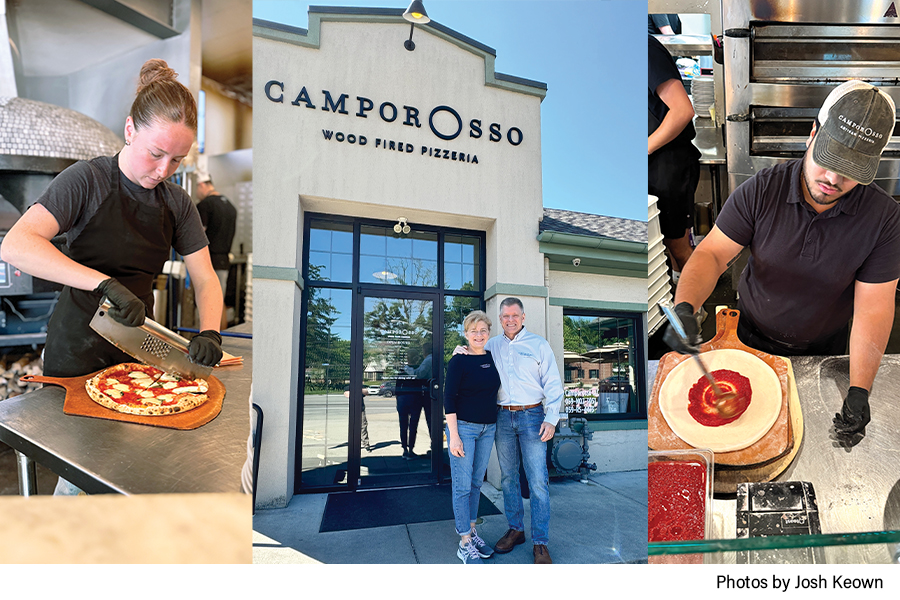
Skechers President Michael Greenberg invested in Los Angeles-based Fresh Brothers, giving the company the added capital it needed to grow the chain.
Photo by Josh Keown
When looking to finance growth, pizzeria operators encounter few sources: the company’s cash reserves; loans from family and friends; capital from a bank or private equity investors, who swap a signed check for an ownership stake in the pizzeria.
“For restaurant owners who don’t want to put collateral on the line and hesitate to borrow from their personal network, investors are an intriguing option,” says Patrick Bottiglieri, who teaches foodservice management at The Culinary Institute of America (CIA).
This includes California-based Fresh Brothers, Pizza Today’s 2012 Independent Pizzeria of the Year.
For years, Fresh Brothers had been involved with Skechers’ Pier to Pier Friendship Walk just outside Los Angeles. Crafting strong ties with the event’s organizers, Fresh Brothers
co-founder Adam Goldberg asked those contacts to facilitate a meeting with Skechers president Michael Greenberg.
“You always need to use the resources and contacts you have,” Goldberg says.
Pitching Greenberg, Goldberg detailed Fresh Brothers’ current reality and future prospects; the Skechers executive grew intrigued. In May 2012, Greenberg signed on as an investor, which allowed Fresh Brothers to clear its debt load and unleash ambitious development plans.
Greenberg “has been a phenomenal investor because he brought us capital and critical knowledge about operating and growing a concept,” says Goldberg, whose 10-unit, L.A.-based chain looks to open five new stores in 2014.
As Fresh Brothers can attest, bringing an investor on board has significant benefits — even at the expense of equity. More interested in ROI than collateral, an investor’s support might not produce as much personal stress as a traditional loan, while one successful deal can spur additional funding. Investors can also inject strategic expertise and become community champions for the restaurant.
“Investors will be your local cheerleaders because your success is in their best interest,” says Ethan Stowell, who runs Seattle’s Ballard Pizza Company.
With those benefits, however, arrive some all-too-common challenges and important considerations. For example, when a restaurant owner satisfies a traditional loan, the bank disappears; investors, however, might linger for years — sometimes overbearingly so. Operators need to consider how much — and perhaps what –– they’re willing to cede. In addition to equity, some investors might seek final approval on site selection or vendors.
“You need to assess if you can live with the specific conditions set forth in the deal, now or in the future,” Goldberg says, adding that raising private equity can become a time-consuming endeavor full of chasing leads and investor pitch meetings.
When seeking investors, many suggest starting close and then branching out from one’s personal network. Turn to family, friends and even guests of the pizzeria for investment-oriented contacts. And tap into the restaurant’s community relationships. A pizzeria’s connections to churches, schools and charities, Goldberg says, can produce investor prospects.
Thereafter, seek investors within the restaurant industry. A number of private equity firms across the country specialize in restaurants, while local business publications might share stories of other expanding restaurants and their financial supporters.
Operators can then solicit investors in other industries, such as finance and real estate, whom Stowell says “are accustomed to investing and familiar with deals.” Commercial builders, in particular, pair income with construction and design knowledge. Owners might also connect with larger lending institutions, including banks and firms like GE Capital, who might identify investors from previous interactions.
“Like a detective, you’re constantly following one lead to the next,” Bottiglieri says.
Operators might even host potential investors in a perk-filled, day-long pitch session, which can provide restaurant leadership a more personal, relaxed environment to connect with investors. Goldberg, meanwhile, likes to invite potential investors into Fresh Brothers to enjoy a meal and observe the pizzeria’s service and culture firsthand.
“Those who’ve invested in us have been in our stores, tasted our food and spoken with our employees,” Goldberg says.
In any pitch to investors, operators must be armed with information and ready to address investors’ principal considerations, namely ROI and risk. The starting point is a sound business plan featuring all of the necessary ingredients, including an executive summary, financials, marketing plan and appendices showing systems, manuals and other elements of a stable, scalable infrastructure. The plan should also include criteria for site selection, including target demographics and potential locations.
“Be thorough and ready to rattle off details on demand,” Bottiglieri says, adding that operators might have other business pros vet the business plan before pitching investors.
Stowell advises operators to present financial records that are accurate, complete and equipped to handle a growing business.
“Keep books that bankers want to see,” he says.
Also, build investor’s confidence by highlighting the restaurant’s positive track record and specific attributes that drive performance, such as cost-control systems or a formula to land school contracts.
“Boast your past to build your future,” Bottiglieri says.
Finally, outline the ROI and define how an investor will recoup his money.
“There are no standard rules here, so it depends on what the business can sustain and what the investors will tolerate,” Stowell says. “Investors need to feel good about the risk they’re taking.”
Four ingredients for a successful operator investor relationship
Business only. Rather than regaling potential investors with thoughts of their own VIP table or decision-swaying input on the restaurant’s wine list or decor, stay focused on the numbers.
“Have a direct conversation that establishes this as a business transaction: this is what I’ll get and this is what you’ll get. Otherwise, you’ll muddy the waters,” Seattle restaurateur Ethan Stowell says.
The written word. A written agreement should include specific terms and a clear and reasonable escape clause for both parties.
“With the details spelled out from the start, it should be a smoother ride,” CIA instructor Patrick Bottiglieri says.
Communication and cash.
Ongoing, honest communications with investors is always positive, even if the news isn’t so rosy, but providing cash is best, Stowell says.
“Get investors their money,” he says.
R-E-S-P-E-C-T: Stowell and Fresh Brothers’ Adam Goldberg tout the benefits of mutual respect between operator and investor.
“It’s vitally important to be on the same page and to understand the shared interest both parties have in a successful restaurant,” Goldberg says.
By Daniel P. Smith
Chicago-based writer has covered business issues and best practices for a variety of trade publications, newspapers, and magazines.







